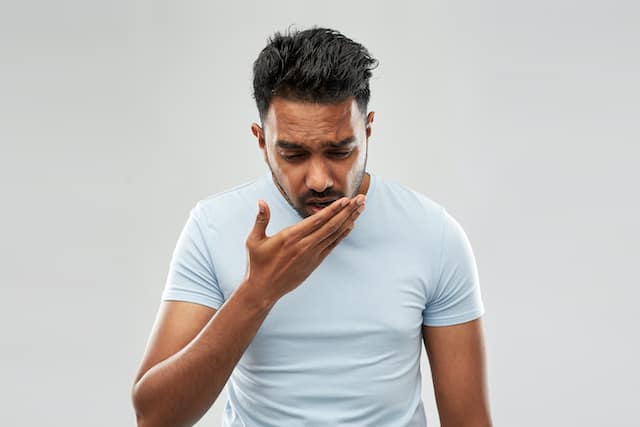If you've noticed that your breath is getting worse as you age, don't worry, you're not alone. Keeping your breath fresh just takes a little extra effort the more... distinguished... you become. So why do older people have bad breath? (Or halitosis, if you want to get technical about it.) Various possible causes range from diet to hygiene, to potential underlying health issues. We'll take you through the potential culprits so you can narrow down the source of any unwanted odours. Then, you just might be able to come up with a solution and you can breathe a big, fresh, sigh of relief.

How To Prevent Bad Breath If You're An Older Adult
What Are the Causes of Bad Breath?
It's not just the oldest and wisest amongst us who exhale in a less-than-desirable fashion. A research study published in the Indian Journal of Dental Sciences notes that oral malodour, also known as bad breath or halitosis, is a common complaint among the general population. Its prevalence has been reported to be as high as 50%. So we'll begin by addressing the causes that tend to affect the masses first because that may provide the easiest and fastest solution for you.
Do you have enough will power to give up certain foods like garlic, onions, and certain spices? Are you willing to cut down on or completely give up drinking alcohol? Or to stop chewing tobacco? These are some of the most common offenders of bad breath (and, of course, alcohol and tobacco can have adverse effects on your health more generally). The only real solution to these causes is avoiding them.
Whatever you decide, giving abstinence a try (at least temporarily) will help you determine what's at fault. The National Health Portal of India points out that non-oral reasons such as sinus (upper respiratory tract infections), diabetes (diabetic ketoacidosis), lung and kidney diseases (end stage renal failure), gastrointestinal disease such as gastroesophageal reflux disease (GERD), menstruation (menstrual breath) accounts for 9% of halitosis cases. While in 1% of patients, the source of halitosis is diets or drugs. Your dental professional is the person best suited to diagnose any potential health or hygiene issues.
How Does Periodontal Disease Cause Bad Breath?
Periodontal disease is one of the most common health-related causes of chronic bad breath, particularly in aging populations. According to the National Oral Health Survey of India, 79.3 per cent people are affected from periodontal disease in the 65-74 year age group population.
Periodontal disease is typically a result of plaque collecting on your teeth and gums (it's also known as gum disease). Your dental professional will be able to remedy the issue pretty quickly by cleaning your teeth and removing any tartar deposits you may have so your gums can heal. They'll likely recommend a stringent dental hygiene routine for you to follow at home to ensure your gums stay healthy and bacteria-free.
How Does Dry Mouth Cause Bad Breath?
Dry mouth (or xerostomia if you want to impress your friends) is another common cause of bad breath in aging populations. You may be wondering why dryness in your mouth would create an unpleasant odour. It's simple. Suppose you don't have enough saliva to wash away food particles. In that case, it can collect on your teeth and gums, and bacteria will flourish.
There are many reasons you could be experiencing xerostomia as you get older. The Healthy Mouth Healthy Body explains that among 40 to 60 years old adults some prescription drugs and medicines can cause dry mouth as a side effect, especially treatments for depression and high blood pressure, and cancer. Also, certain medical conditions like diabetes affect the salivary glands, so they don't produce as much saliva and the mouth tends to be dryer.
Regardless of the cause, keeping moisture in your mouth can help with unpleasant odours. Some older people use artificial saliva products, but sipping water or sucking on sugar-free lozenges throughout the day can help a lot, too.
How Do Dentures, Partials, and Fixed Bridges Cause Bad Breath?
If you wear removable replacement teeth, that's another possible reason your breath isn't as fresh as you'd like it to be. Food may have built up in hard to reach crevices, allowing bacteria to grow. A more stringent cleaning routine of your artificial teeth could rid your mouth of any unwanted odours.
Now that you know the most common causes of halitosis for older adults, we hope you're better able to narrow down what's causing any problems for you. Most often, ridding yourself of bad breath is as simple as practicing good oral hygiene. Brush at least twice a day (don't forget to brush your tongue), floss or clean between your teeth with interdental brushes or water flossers at least once a day, and consider using other helpful products like antimicrobial mouth rinses and tongue scrapers. Be sure to see your dental professional for regular cleanings – not only to keep your teeth pearly white and bacteria-free but also to ensure they're able to catch potential underlying health issues. And whatever the reason for your bad breath, remember there is a solution out there that will leave you breathing fresh and easy.
This article is intended to promote understanding of and knowledge about general oral health topics. It is not intended to be a substitute for professional advice, diagnosis or treatment. Always seek the advice of your dentist or other qualified healthcare provider with any questions you may have regarding a medical condition or treatment.





